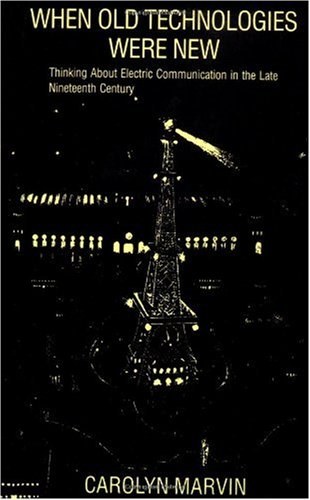When Old Technologies Were New
Douban
Thinking About Electric Communication in the Late Nineteenth Century
Carolyn Marvin
overblik
In the history of electronic communication, the last quarter of the nineteenth century holds a special place, for it was during this period that the telephone, phonograph, electric light, wireless, and cinema were all invented. In When old Technologies Were New, Carolyn Marvin explores how two of these new inventions--the telephone and the electric light--were publicly envisioned at the end of the nineteenth century, as seen in specialized engineering journals and popular media. Marvin pays particular attention to the telephone, describing how it disrupted established social relations, unsettling customary ways of dividing the private person and family from the more public setting of the community. On the lighter side, she describes how people spoke louder when calling long distance, and how they worried about catching contagious diseases over the phone. A particularly powerful chapter deals with telephonic precursors of radio broadcasting--the "Telephone Herald" in New York and the "Telefon Hirmondo" of Hungary--and the conflict between the technological development of broadcasting and the attempt to impose a homogenous, ethnocentric variant of Anglo-Saxon culture on the public. While focusing on the way professionals in the electronics field tried to control the new media, Marvin also illuminates the broader social impact, presenting a wide-ranging, informative, and entertaining account of the early years of electronic media.
contents
"Deserves close reading by historians of the modern media. Drawing on contemporary popular and professional sources, Carolyn Marvin challenges the traditional view of the social origins of electric media...An important addition."--Journal of American History
"The originality of her analysis and thoughtful questions provide a valuable perspective on this critically important period in the history of American technology."--American Historical Review
"Marvin's work is substantial, and her exploration of primary sources laudable. Her collection of anecdotes and significant historical residues is itself rewarding. Add to that her provocative theoretical discussions and you have a work worthy of a scholar's attention."--Journalism History
"This most informative book helps the modern reader to comprehend the speed at which electricity-dependent technologies have altered human perceptions of humankind and the world."--CHOICE
"A wide-ranging, informative, and entertaining account of the early years of electric and electronic development, this book re-thinks the traditional artifactual and institutional approaches to media history."--Electrical Review
"A solidly researched study."--Library Journal
"One has only to think of society's alarms and excursions on the theme of nuclear energy or recombinant DNA to see the relevance and timeliness of the author's engaging sociotechnological insights."--Kirkus Reviews
"Could provide a model for other historians...Throughout the book Marvin chooses arresting and funny examples to illustrate her points...[S]he has applied traditional historical techniques rigorously and well and used a number of new methods with interesting results."--ISIS